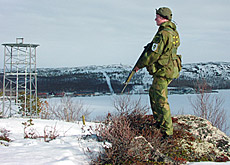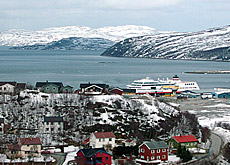On patrol at the final frontier

Norwegian army conscript Stian Vavik is stationed on the border with Russia at the edge of the Schengen area - Europe’s passport-free zone.
If the Swiss vote next month to join Schengen, the 20-year-old would become one of the guards at Switzerland’s new final frontier.
Vavik is aware of the importance of his work in Kirkenes, the northernmost tip of the borderless Schengen area of 15 European countries.
He chose to serve as a border guard in the Norwegian army because he was looking for a new challenge.
Vavik and his three colleagues are temporarily stationed at a cabin with a view of the Storskog border-crossing point in the Pasvik valley which leads into northern Russia.
A stranger might be forgiven for mistaking the cabin, perched on a boulder above a frozen lake, for an ordinary shelter for cross-country skiers or hikers.
But the snowmobiles parked outside, a row of identical-looking skis and the gun rack make you think again.
“I come from Oslo and being in this environment is like being in a different country. It is an exciting experience,” says army conscript Vavik during our conversation in the simple but cosy kitchen.
Tour of duty
Vavik volunteered for duty with the border guards in this remote region and is hoping to go on to study engineering in Trondheim or Oslo.
“I didn’t want to spend my time in the army with a dull job, like sitting in a little box and pushing a button to open a gate somewhere,” he says.
“Here I get to drive snowmobiles, fly in a helicopter and be outdoors. And we are doing something useful.”
Vavik, who has already served ten out of the required 12 months, admits that life at the final frontier can be tough during the cold and dark winter.
He says he has learnt a lot about himself, especially during the first six months of training.
“We were testing our limits and I found that physically I can take much more than I thought.”
On patrol
Vavik is not allowed to disclose any details about patrol duty along the border with Russia.
“All I can say is that some patrols are very long and others are a bit shorter. And it is generally peaceful. The world would know if it wasn’t.”
He says that traditionally people on both sides of the border have enjoyed close ties and that Norwegians have not forgotten how Russia came to their aid during the Second World War.
Vavik says that sometimes he and his four-man team have to go for days without much sleep.
They work closely with the Norwegian police and are partly trained by them.
“I think that we and the police are similar in many ways, but we are armed while Norwegian police normally are not.”
Schengen border
Vavik says he knows about the Schengen treaty and what it means to be monitoring a border to Europe’s large passport-free zone.
“We don’t think about it all the time, but sometimes you realise that this really is an important job.”
He says the Norwegian border guards take their responsibilities seriously and that they have the necessary equipment to carry out their work efficiently.
Vavik and his three colleagues have become close friends, something he believes is inevitable “when you work together as part of the same team for six months”.
He is amused by the many European and American tourists who travel all the way to Kirkenes just to stand on the frontier.
“They come by the busload to the border crossing in Storskog to look across to Russia. Then they take pictures and go home,” he laughs.
And what about the foreign journalist, trekking all the way to the arctic wilderness? Vavik wonders whether the man with the notepad is not a bit late.
“Kirkenes was a very important place during the war, but that’s no longer the case.”
swissinfo, Urs Geiser in Kirkenes
Norwegian army conscripts are deployed by the justice ministry at Europe’s northernmost external Schengen border with Russia.
They serve for 12 months in the Border Guard Company, including a six-month training period. They have limited police authority.
About 150 soldiers from the Sør-Varanger garrison are stationed in northern Norway to monitor the 196km frontier.

In compliance with the JTI standards
More: SWI swissinfo.ch certified by the Journalism Trust Initiative


You can find an overview of ongoing debates with our journalists here. Please join us!
If you want to start a conversation about a topic raised in this article or want to report factual errors, email us at english@swissinfo.ch.